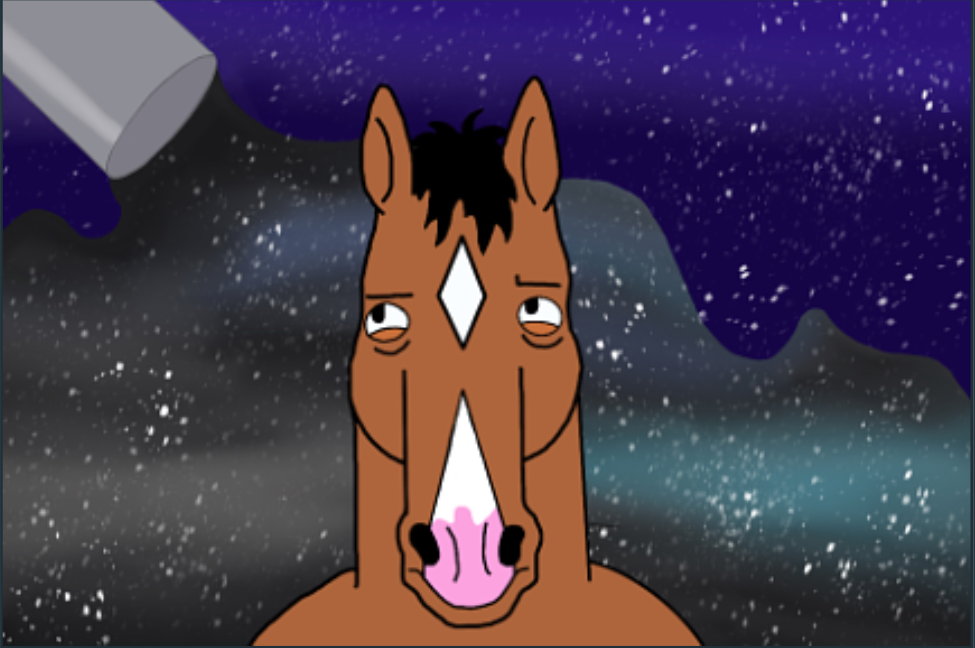On paper, The story of a drunk anthropomorphic horse dealing with life’s traumas in a corny sitcom shouldn’t work. Yet, Bojack is a better reflection of intrusive thoughts, identity crises, and mental health than most human characters. The dichotomy between the absurdity of multi-dimensional talking animals and grounded themes like depression creates a space in which the writers can confidently comment on mental health through laughter.
This is a very dark show. Characters suffer, consequences exist, and past events are acknowledged in a bittersweet light.
Morally ambiguous characters are expected in such a gray show. We often expect development as the story progresses towards a personality the audience can root for, but when the same mistakes are made time and time again, redemption becomes tough. What happens when the character we long to support only falls further into self-destruction? Or better yet, what if we find ourselves supporting them regardless?
And it is this moral dilemma we are gently nudged into that sparks contemplation. Bojack tries to justify his actions by believing he’s innately a good person, just with bad moments. In reality, he is a bad person, with only moments of goodness, despite how he repeatedly tries to justify himself. And this insight doesn’t hit him until it comes from his best friend in season three.
“You are all the things that are wrong with you. It’s not the alcohol, or the drugs, or any of the [bad] things that happened to you in your career, or when you were a kid. It’s you.”
Todd clarifies that the only thing that controls Bojack’s actions is himself. He can’t keep blaming the past for his problems because even that is a choice he is making: to evade accountability.
Bojack is aware of his repeating self-destruction as he barrels towards perpetual apathy, yet he refuses to break the cycle. He still seeks help from the people around him, knowing that he doesn’t deserve it, nor will he repay it. To change, one must take initiative. But Bojack, like many of us, simply chooses not to. His coping skills are far from healthy, and he stays stuck in a mindset of “old habits die hard.”
Cynicism seeps through every scene of the show, despite the colorful visuals and quirky characters. Yet, this gratifyingly grounded drama draws out humor in places we don’t expect. Even an entire episode about an earnest eulogy ends with a dumb punchline.
Sometimes the abrupt shift between tragedy and comedy is jarring, akin to a Hasan Minhaj special. The show constantly rides a line between shockingly relatable moments and dumb silliness. It manages to bring us to laugh through tears, and that’s a very hard thing to accomplish. Maybe that’s why it’s so successful, because the vulnerable moments shatter like glass, but every time it tries gluing them together, there’s a joke to go along with it.
Moral ambiguity is one of humanity’s biggest mysteries. It is hard to decide if what you are doing is right or wrong when you were never told what the right thing to do is. Bojack from episode one makes decisions that any reasonable person would never make, though he recognizes this. It’s just that he has no clue how to fix any of this since he was never given the choice to fix himself and mixed with his addiction and raging depression, he does not see a point in going on.
Bojack is supposed to represent your general washed-up middle-aged male celebrity, but in doing so, he surprisingly reflects the King of Rock and Roll himself, Elvis Presley. Two icons of their short stardom had a troubled start which led to a terrible end. This does not excuse what either Elvis or Bojack did but it gives some explanation as to why someone would end up this way.
Bojack grew up with verbally, physically, and mentally abusive parents which led to him doubting his actions and life as he grew up. He did not believe that he was a good person and in doing so believed that no one is a good person. Elvis had a normal childhood, but had a terrible career and people who surrounded him like Colonel Tom Parker. This led him to believe he didn’t have a place here and he latched on to people since he believed he was only good when he surrounded himself with good people like his wife Priscilla. This is a coping mechanism Bojack himself also uses throughout the show seen with all of his love interests.
Neither can not believe that there are people in their lives who want to be good and want them to be good since their, and specifically Bojack’s, whole life outside of their careers have been told that they are nothing. In the eulogy, Bojack wrote for his mother’s funeral, not once can he take his mom seriously. Yes, he is hurting immensely but this woman gave him no reason to feel bad for her. She did not teach him love and she did not teach him good, he even says “All I know about being good, I learned from TV. And in TV, flawed characters are constantly showing people they care with these surprising grand gestures. And I think that part of me still believes that’s what love is. But in real life, the big gesture isn’t enough. You need to be consistent, you need to be dependably good.”
This is not to defend Bojack but to give him some humanity that he has lost over time for himself and others. It is hard to keep going when you ruin everything due to your lack of love and caring from a young age and the trauma that persisted into your adulthood.










Ms. Porada • Feb 15, 2024 at 11:48 am
Awesome, nuanced analysis of one of my favorite recent watches. Really well done, writers! And if you ever want to talk Bojack, find me in H203 haha. :’)